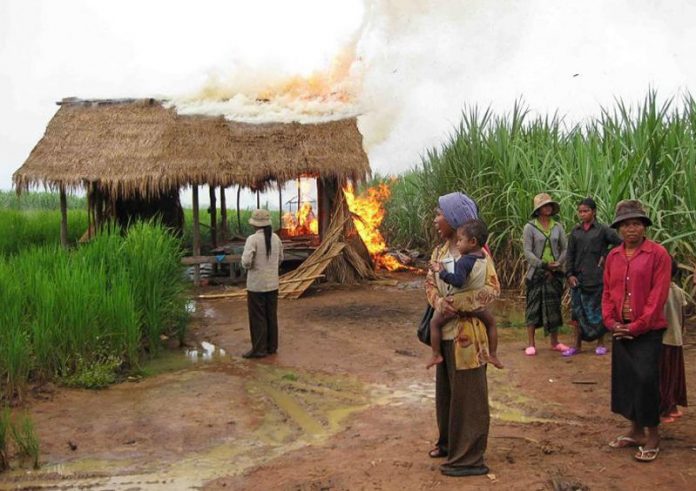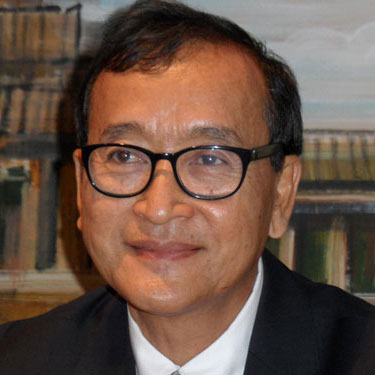
Southeast Asia’s first cross-border human rights class action is a step forward for corporate accountability in the region and a warning to foreign companies who see Cambodian land as a risk-free resource for development.
Thailand’s Bangkok South Civil court on July 31 decided to recognise the class action brought by Cambodian families seeking redress from Thai sugar company Mitr Phol, following their forcible eviction from their land. Cambodian police burned hundreds of homes to the ground in 2009 to clear land for a Mitr Phol sugar plantation.
The case will help to deter companies that use land grabs as part of their business strategy in Cambodia. It also serves as a wake-up call to multinationals that use such companies in their supply chains. Mitr Phol is one of the world’s largest sugar producers, with operations in China and Australia. Past or present customers of Mitr Phol, which stopped operating in Cambodia in 2015, include Nestle, Coca-Cola, Pepsi and Mars Wrigley. Industry groups such as Bonsucro, which incongruously handed Mitr Phol an annual award for sustainability in 2015, will be encouraged to dig a little deeper and do their homework first.
Such abuses are possible in Cambodia because of the country’s modern history. Under the Khmer Rouge from 1975 to 1979, private property was abolished and cadastral records completely destroyed. After the fall of the Khmer Rouge, land ownership claims from before 1979 remained void. Legislation was passed on the principle that occupying land for longer than five years conferred ownership. But the law was applied in an unequal and haphazard way. It was completely ignored in areas gripped by land speculation: urban centres; agricultural, industrial or commercial development zones; and border areas. Farmers who had occupied land for more than 20 years were pushed out under the pretext that they were “illegally” occupying land which “belonged to the state.”
In fact, private companies wanted to get their hands on this “prime” land with the complicity of corrupt authorities. The chains of corruption led from the commune chiefs to the Cabinet of Ministers, via the heads of province, the land registry, the police and the courts. The result was a redistribution of land in favour of a new political and financial oligarchy.
The state has remained able to reclassify and redistribute land at will. Some of those evicted by Mitr Phol had established rights to the land under Cambodian law. But the only reliable land titles in Cambodia are those granted by central government to industrial interests.
Sugar and EBA
The case is just the tip of the iceberg. Under Prime Minister Hun Sen, hundreds of thousands of Cambodians have been driven off their land to allow corporate access to resources or to make way for real-estate development. Sugar was one of the main commodities produced in the context of the European Union’s Everything But Arms (EBA) scheme to allow Cambodia duty-free access to European markets.
One of the scheme’s effects was to encourage industrial plantations in Cambodia to produce raw sugar for export. Cambodia’s Koh Kong and Kampong Speu provinces have also seen large-scale evictions and human rights abuses in the quest for sugar. This assessment from Equitable Cambodia and Inclusive Development International on Cambodia’s sugar plantations was written as long ago as 2013:
“Cambodia’s policy of granting large-scale land concessions to private investors for agro-industrial development and the EU’s policy of granting preferential tariffs to spur such investment in least developed countries both carry risks of devastating human rights impacts.” Such a result “betrays the original intent of the EBA initiative as well as the commitments of the European Union (EU) to uphold human rights in.”
Despite such warnings and the evidence which was already clear, steps to partially withdraw Cambodia’s EBA access are only now being taken.
Impunity unravels
The plaintiffs in this case are Cambodian citizens who represent over 700 families who lived on and farmed the land. The evictions resulted from land concessions in Oddar Meanchey province granted by the Cambodian government to companies linked to Mitr Phol in January 2008. The three adjoining concessions totalled 19,736 hectares, so breaking Cambodian law which prohibits concession areas of more than 10,000 hectares.
In April 2008, 154 homes were demolished by company staff under the guidance of local authorities. In October 2009, about 100 homes were burned down by police. Most of the plaintiffs had lived and worked in the five villages for their whole lives. Affected households on average lost five hectares of rice fields, but were offered smaller plots of distant land in compensation – land that was often already owned by others.
Forests inside the concessions that the villagers relied upon for their livelihoods were illegally logged. Even the rice crops which were ready for harvest were looted. Many were forced to migrate to Thailand in the hope of finding work. Some were simply left homeless: those who protested were arrested and imprisoned.
Foreign companies which take part in land grabbing in Cambodia will find that other judicial systems are independent, rather than controlled and compliant as in Hun Sen’s Cambodia. In international human rights law, as has been successfully argued in this case, language and national and social origins are prohibited as grounds of discrimination. Impunity, as others in Cambodia will find out, may last for a long time, but does not last forever.
The views and opinions expressed in this article are those of the author.

Sam Rainsy, Cambodia’s finance minister from 1993 to 1994, is the co-founder and acting leader of the opposition Cambodia National Rescue Party (CNRP).

